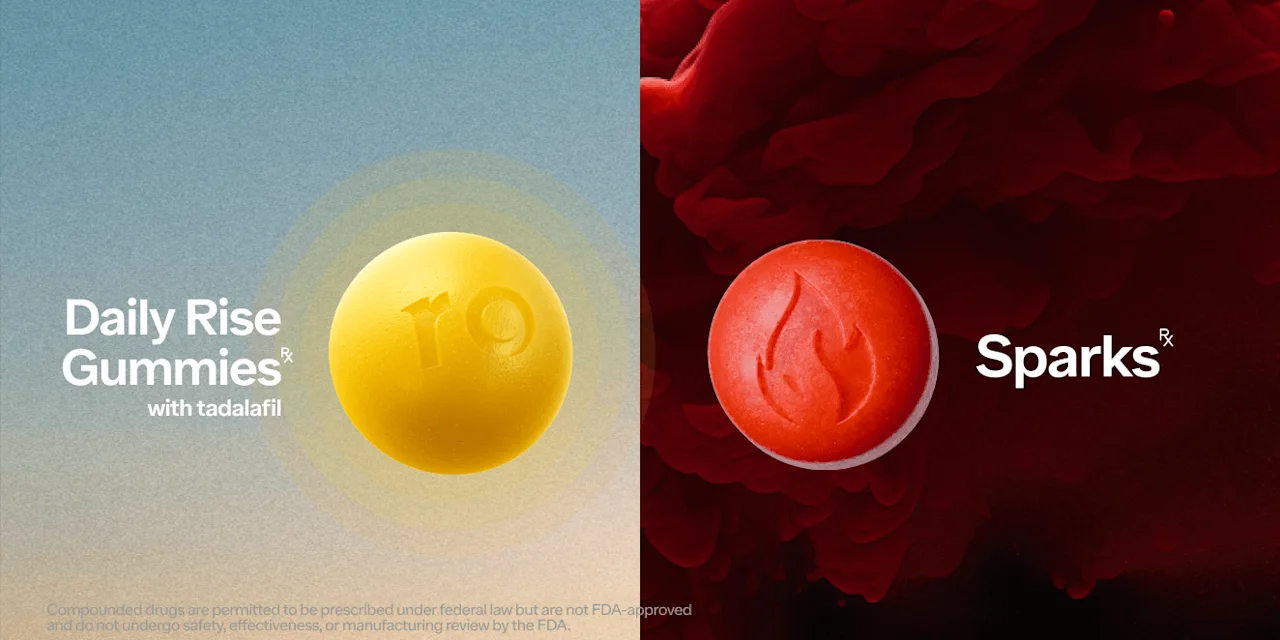Here's what we'll cover
If you’re interested in giving Viagra a try to treat erectile dysfunction, getting the dose just right can be challenging. Too much and you risk greater side effects. Too little, and you may not reap the benefits. Brand name Viagra is available in three doses: 25mg, 50mg, and 100mg. While 50mg is often the dosage people start with, your healthcare provider will weigh factors including age, weight, health status, lifestyle, and more to determine the safest and most effective starting Viagra dosage for you. Remember, your dosage can always be changed with the guidance of your healthcare provider depending how you react to treatment.
Continue reading to learn more about Viagra dosage.
What is Viagra’s dosage?
There are three brand-name Viagra dosages: 25mg, 50mg, and 100mg. Generic sildenafil can also be prescribed in 20mg, 25mg, 50mg, and 100mg dosages. The maximum daily dose is 100mg.
Starting Viagra dose
Healthcare providers typically begin patients on a 50mg dose of Viagra, in tablet form, to be taken 30-60 minutes before sex (and no more than 4 hours before sex). Based on your experience with the medication including potential side effects, your provider may lower your dose to 25mg. Your healthcare provider will prescribe the starting dose they believe is best for you and will take into consideration other medical conditions you may have or other medications you are taking.
Maximum Viagra dose
The maximum recommended Viagra dose is 100mg per day. The maximum dose may be prescribed to you if smaller doses of Viagra have not been effective and your body has tolerated the medication well, with few side effects. Higher doses of Viagra would be categorized as “off-label” use (an unapproved use for an approved medication, prescribed by a healthcare provider). You should never change your dose of Viagra on your own–only take the medication as prescribed by your healthcare provider.
Tablet vs. liquid form
Viagra is available in both tablet and liquid forms. Tablets are the most commonly prescribed form of sildenafil prescriptions in the US. However, liquid sildenafil may be a good option for those who have difficulty swallowing pills. The liquid can be mixed with food or beverages, and provide faster absorption (which means faster action). Talk to your healthcare provider about which form of Viagra is right for you and what the appropriate dosage is.
What factors affect my Viagra dosage?
Your healthcare provider may not get your Viagra dosage right on the first try. But it’s better to start with too little than too much. The Viagra dosage prescribed depends on the following:
Age
Overall and cardiovascular health
Medical conditions
Your reaction to the first dose
How frequently you use the medication
If you’re taking Viagra exactly as instructed and still don’t achieve the desired results, talk to your healthcare provider about changing your dosage.
How do you know what dosage is right for you?
Contrary to popular belief, the goal of ED medication is not to find the highest dose of Viagra you can handle, but to find a safe and effective dose. Your healthcare provider will strive to find the smallest amount of medicine necessary to achieve satisfactory erections, to reduce your risk of side effects.
Additionally, ED meds aren't one-size-fits-all. People have different needs, so talk with your healthcare provider about your expectations for Viagra, and be honest about how you and your partner(s) plan to use it. Be prepared to answer questions like:
How many times a week do you plan to have sex?
Are you willing to take Viagra at the appropriate time for the medication to work effectively?
Are you concerned about any side effects of Viagra?
For some, the 25mg Viagra dosage is enough to have a great experience in the bedroom. Others need the maximum dose (100mg) to achieve the same result. Work with your doctor to find the right dose based on your expectations, medical history, and symptoms, and report any side effects.
Above all—be honest about your medical history and always follow your healthcare provider's instructions. Don't change your dose without talking to your healthcare provider. More Viagra doesn't always mean a stronger erection, and higher doses can come with more side effects.
How to take Viagra
As with any medication, you should always take Viagra or sildenafil as directed by your healthcare provider. You can take Viagra anywhere from 30 minutes to four hours before sexual activity. Don’t take Viagra more than once in a 24-hour period, or combine it with other PDE5 inhibitors. Taking too much increases your risk of side effects.
You can take Viagra with or without food. However, avoid eating high-fat meals before taking the pill–research suggests fatty foods may impact how your body absorbs the medication, causing it to take longer to work.
Viagra drug interactions
Some over-the-counter and prescription drugs can cause dangerous drug interactions with Viagra. For example, people taking nitrates for certain heart conditions should not take Viagra. Both nitrates (like nitroglycerin) and sildenafil affect nitric oxide levels, and the combination can lead to a potentially dangerous drop in blood pressure. Poppers, or amyl nitrites, should also be avoided when taking Viagra.
If you take medications that affect the breakdown of sildenafil (like ritonavir, erythromycin, itraconazole, and ketoconazole), you may need a lower dose of sildenafil or Viagra.
Frequently asked questions about Viagra dosages
How much Viagra should I take the first time?
As mentioned, the recommended starting dose for Viagra is typically 50mg, taken approximately one hour before sex. This dosage can be adjusted based on your response to the medication. It's important to take Viagra as prescribed by your healthcare provider. Avoid taking more than one dose of Viagra within a 24-hour period to minimize the risk of side effects.
How does age affect Viagra dosage?
Healthcare providers may prescribe a lower dosage of Viagra if you’re over the age of 65. As you age, your body may process medications differently. Therefore, your doctor may recommend starting with a 25mg dose of Viagra if you’re over 65 and may consider going up if it’s not working enough
What should you do if you take too much Viagra?
Taking too much Viagra can be dangerous. If you take more Viagra than you are prescribed, you could experience rare but serious side effects such as priapism (an erection that lasts longer than four hours). If you experience priapism after taking too much Viagra, you should seek medical attention immediately. Taking too much Viagra can also worsen side effects like headache.
Other rare but possible side effects from taking too much Viagra include low blood pressure and vision changes such as blurred vision or a loss of vision.
What is the dosage of Cialis vs. Viagra?
Cialis (tadalafil) and Viagra are both effective treatments for erectile dysfunction, but their dosages and how long they last differ.
Viagra is typically prescribed in doses of 25mg, 50mg, or 100mg, taken as needed about an hour before sexual activity, with effects lasting up to 4-5 hours. Cialis, on the other hand, is available in daily (or as-needed) doses of 2.5mg or 5mg, or in as-needed doses of 10mg and 20mg. The as-needed doses of Cialis should be taken at least 30 minutes before sexual activity and can last up to 36 hours. If you’re looking for an alternative, Ro Sparks combines the active ingredients found in both Viagra and Cialis and can start working in as little as 15 minutes.
The choice between the two medications depends on your lifestyle and how often you plan to have sex. Talk to your healthcare provider about which option is best for you.
When it comes to erectile dysfunction medication, more is not necessarily better (or safer). If you’re concerned about erectile dysfunction, make an appointment with your healthcare provider. Take your Viagra as prescribed, and adjust as needed under the supervision of your healthcare provider, not on your own.
DISCLAIMER
If you have any medical questions or concerns, please talk to your healthcare provider. The articles on Health Guide are underpinned by peer-reviewed research and information drawn from medical societies and governmental agencies. However, they are not a substitute for professional medical advice, diagnosis, or treatment.
Viagra Important Safety Information: Read more about serious warnings and safety info.
Cialis Important Safety Information: Read more about serious warnings and safety info.
CMP Pharma. (2023). LIQREV® (sildenafil) oral suspension. Retrieved from https://www.accessdata.fda.gov/drugsatfda_docs/label/2023/214952s000lbl.pdf
DailyMed. (2021). Viagra- sildenafil citrate tablet, film-coated. Retrieved on Oct. 17, 2022 from https://dailymed.nlm.nih.gov/dailymed/drugInfo.cfm?setid=0b0be196-0c62-461c-94f4-9a35339b4501
Eli Lilly. (2011). CIALIS (tadalafil) tablets, for oral use. Retrieved from https://www.accessdata.fda.gov/drugsatfda_docs/label/2011/021368s20s21lbl.pdf?msclkid=c3d826cdc0eb11ec9afbdda093132066
Pfizer. (2014). VIAGRA® (sildenafil citrate) tablets, for oral use. Retrieved from https://www.accessdata.fda.gov/drugsatfda_docs/label/2014/20895s039s042lbl.pdf
Smith, B. P. & Babos, M. (2022). Sildenafil. StatPearls. Retrieved on Oct. 17, 2022 from https://www.ncbi.nlm.nih.gov/books/NBK558978/
Zucchi, A., Costantini, E., Scroppo, F. I., et al. (2019). The first-generation phosphodiesterase 5 inhibitors and their pharmacokinetic issue. Andrology, 7(6), 804–817. doi: 10.1111/andr.12683. Retrieved from https://www.ncbi.nlm.nih.gov/pmc/articles/PMC6790582/













